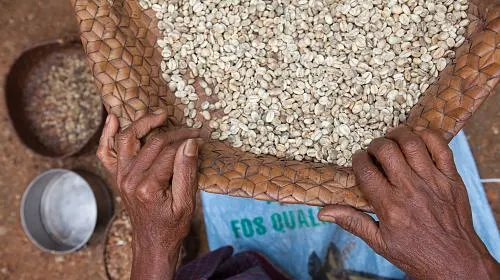WASHINGTON (Feb. 4, 2014) – CARE applauds the Senate approval of reforms to the U.S. international food assistance program contained in the 2014 Farm Bill under the leadership of Sen. Debbie Stabenow (D-MI), working with Sen. Thad Cochran (R-MS), and House colleagues, Rep. Frank Lucas (R-OK) and Rep. Collin Peterson (D-MN).
For more than two years, CARE has fought for provisions in the current Farm Bill that include significant, common-sense, lifesaving reforms to the U.S. international food assistance program. CARE thanks Sen. Stabenow for her efforts, working with her colleagues across the aisle and across the capitol, the U.S. government that will be able to reach hundreds of thousands more hungry people.
“By allowing greater flexibility for the U.S. to respond to global food emergencies in a smarter, more efficient manner, these provisions will enable us to reach many more hungry people around the world,” said CARE President and CEO Dr. Helene D. Gayle. “The ongoing crisis in Syria and recent disaster in the Philippines are reminders of the urgent need for a food assistance program that is able to reach people quickly and cost-efficiently.”
The food aid reform provisions in the Farm Bill will enable the U.S. government, working with partners reach hundreds of thousands more individuals around the world facing chronic hunger. It builds on the momentum started in the FY14 omnibus bill, which gave greater flexibility in how the United States responds to a food emergency by reducing the need for monetization. Monetization is the current program in which food aid is purchased in the United States and shipped overseas to fund development programs. Read more on CARE’s views on the FY14 omnibus bill here.
For many years, CARE was a strong partner of the U.S. government in providing food aid globally. But CARE recognized that the system was flawed; food aid can be slow and costly, and the process of monetization is inefficient, often distorting and hindering local markets. Seven years ago, CARE made the decision to phase out of open-market monetization of commodities. As of 2009, CARE ended the open-market sale of U.S. food aid to generate cash for our development and emergency programs, also known as monetization.
Specifically, the food aid reform provisions in the Farm Bill would:
- Establish a permanent local and regional procurement program authorized at $80 million annually to enable the U.S. Department of Agriculture to purchase food closer to an emergency, when appropriate.
- Increase the share of Title II (Food for Peace) funds that can be used to cover non-commodity expenses of food aid programs, up to 20 percent from its current cap of 13 percent, thus decreasing the need to monetize food aid commodities and improving flexibility for programs.
- Require the U.S. Agency for International Development to monitor recovery rates for monetization transactions performed under food aid programs, and report to Congress annually on transactions that fail to generate at least a 70 percent recovery rate.
CARE’s decades of work in emergency food assistance has shown us that the current U.S. food aid programs can be made far more efficient and effective in meeting the needs of women, men and children during a crisis. The reforms included in the Farm Bill conference are an important step towards improving the U.S. food aid program, including ending the harmful practice of monetization.
About CARE
Founded in 1945 with the creation of the CARE Package®, CARE is a leading humanitarian organization fighting global poverty. CARE places special focus on working alongside poor girls and women because, equipped with the proper resources, they have the power to lift whole families and entire communities out of poverty.
Our six decades of experience show that when you empower a girl or woman, she becomes a catalyst, creating ripples of positive change that lift up everyone around her. That’s why girls and women are at the heart of CARE’s community-based efforts to improve education, health and economic opportunity for everyone. We also work with girls and women to promote social justice, respond to emergencies and confront hunger and climate change. Last year CARE worked in 84 countries and reached more than 83 million people around the world. To learn more, visit www.care.org.
Media Contact
Washington, D.C.: Stephanie Chen, CARE, schen@care.org, +1-202-595-2824

